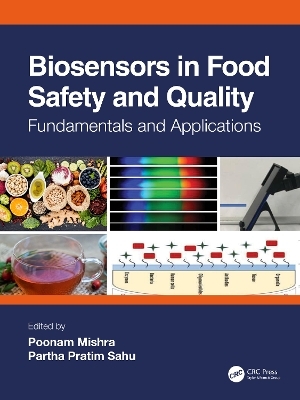
Biosensors in Food Safety and Quality
CRC Press (Verlag)
978-0-367-20164-7 (ISBN)
Biosensors in food safety and quality have become indispensable in today’s world due to the requirement of food safety and security for human health and nutrition. This book covers various types of sensors and biosensors that can be used for food safety and food quality monitoring, but these are not limited to conventional sensors, such as temperature sensors, optical sensors, electrochemical sensors, calorimetric sensors, and pH sensors. The chapters are framed in a way that readers can experience the novel fabrication procedures of some advanced sensors, including lab-on-a-chip biosensors, IoT-based sensors, microcontroller-based sensors, and so on, particularly for fruits and vegetables, fermented products, plantation products, dairy-based products, heavy metal analysis in water, meat, fish, etc. Its simplistic presentation and pedagogical writing provide the necessary thrust and adequate information for beginners, scientists, and researchers.
The book offers comprehensive coverage of the most essential topics, which include the following:
Fundamentals of biosensors
Overview of food safety and quality analysis
Major toxicants of food and water
Fabrication techniques of biosensors applicable for different segments of the food industry
This book serves as a reference for scientific investigators who work on the assurance of food safety and security using biosensing principles as well as researchers developing biosensors for food analysis. It may also be used as a textbook for graduate-level courses in bioelectronics.
P. Mishra received her M. Tech. degree HBTI Kanpur and Ph.D. in Food Engineering from Tezpur University, India. In 2004, Dr Mishra joined Center of Food Technology, University of Allahabad as a Lecturer, where she has been engaged in teaching, and R&D works related to Food Engineering and Technology. Dr Mishra also actively involved in establishment of Food Quality Control Laboratory at Center of Food Technology. In 2009, she joined Tezpur University as Assistant Professor and presently she is working as an Associate Professor in Department of Food Engineering and Technology, Tezpur Central University, India. Her field of Interest includes fabrication of functional nano-materials, functional food, food analysis and biosensors. She handled number of external funded projects successfully. She has published more than 35 research papers in peer reviewed National/ International Journals, several papers in National/International conferences, book chapters and popular articles. She has three patents to her name. She has received several National and International award. She is a life member of Association of Food Scientists & Technologists (India), and Nutrition Society of India. P. P. Sahu received his M.Tech. degree from the Indian Institute of Technology Delhi and his Ph.D. degree in engineering from Jadavpur University, India. In 1991, he joined Haryana State Electronics Development Corporation Limited, where he has been engaged in R&D works related to optical fiber components and telecommunication instruments. In 1996, he joined Northeastern Regional Institute of Science and Technology as a faculty member. At present, he is working as a professor in the Department of Electronics and Communication Engineering, Tezpur Central University, India. His field of interest is integrated optic and electronic circuits, food sensors, wireless and optical communication, clinical instrumentation, green energy, etc. He has received an INSA teacher award (instituted by the highest academic body Indian National Science Academy) for high level of teaching and research He has published more than 100 papers in peerreviewed international journals, 70 papers in international conference and has written two books published by Springer-nature , two books by CRC press and two books by McGraw Hill, India. Dr Sahu is a distinguished Fellow of the Optical Society of India, Life Member of Indian Society for Technical Education and Senior Member of the IEEE.
1. Introduction 2. Calorimetric Biosensors: Core Principles, Techniques, Fabrication, and Application 3. Optical Biosensors: Principles, Techniques, Sensor Design, and Their Application in Food Analysis 4. Piezoelectric Biosensors: Principle, Techniques, and Their Application in Food Analysis 5. Electrochemical Sensors: Core Principals, New Fabrication Trends, and Their Applications 6. Colorimetric Biosensors: Principal, Fabrication, and Application in Food Analysis 7. Nanobiosensors: Principles, Techniques, and Innovation in Nanobiosensors 8. Biosensors Involved in Fruit and Vegetable Processing Industries 9. Biosensors Involved in Dairy Industries 10. Bio/Chemical Sensors and Microsensors Involved in the Meat Industry 11. Toxicants/Pesticide Residue/Adulteration Detection in Some Valuable Plantation Products 12. Biosensors Involved in Fermented Products 13. Detection of Heavy Metals in Water Using Biosensors 14. Application of Biosensors in Food Safety 15. Feasibility of Biosensors
| Erscheinungsdatum | 22.04.2022 |
|---|---|
| Zusatzinfo | 25 Tables, black and white; 68 Line drawings, black and white; 1 Halftones, black and white; 69 Illustrations, black and white |
| Verlagsort | London |
| Sprache | englisch |
| Maße | 210 x 280 mm |
| Gewicht | 453 g |
| Themenwelt | Naturwissenschaften ► Chemie ► Analytische Chemie |
| Technik ► Lebensmitteltechnologie | |
| ISBN-10 | 0-367-20164-X / 036720164X |
| ISBN-13 | 978-0-367-20164-7 / 9780367201647 |
| Zustand | Neuware |
| Informationen gemäß Produktsicherheitsverordnung (GPSR) | |
| Haben Sie eine Frage zum Produkt? |
aus dem Bereich


